Bosch dishwashers are known for their efficiency and reliability, but even these top-tier appliances can encounter problems. One common issue many users face is drainage problems. A dishwasher that doesn’t drain properly can lead to standing water, unpleasant odors, and potentially even damage to the appliance.
Did you know that a faulty drain pump or clogged filters are often the culprits behind drainage issues? These problems can stem from food particles and debris getting stuck in the system, preventing the dishwasher from functioning optimally.
In this guide, we’ll explore the most common problem with Bosch dishwashers, diving into the specifics of drainage issues and offering solutions to help you get your appliance back in working order. Let’s tackle these common Bosch dishwasher problems together and ensure your kitchen runs smoothly!

Why Is My Bosch Dishwasher Not Draining Properly?
A Bosch dishwasher not draining properly is a common issue that can stem from several potential problems. Understanding these causes and how to address them can help restore your dishwasher’s functionality.
Common Causes of Drainage Issues
Blocked Filter: The filter traps food particles and debris to prevent them from re-entering the clean water. If it becomes clogged, water may not drain effectively.
Clogged Drain Pump: The drain pump expels water from the dishwasher. If it gets blocked with debris, it can fail to drain water.
Twisted or Kinked Drain Hose: The drain hose connects the dishwasher to the sink or garbage disposal. If it is kinked or twisted, it can obstruct water flow.
Clogged Drain Lines: Sometimes, the drain line that connects to the sink or garbage disposal can become clogged, preventing water from draining.
Air Gap Blockage: If your dishwasher has an air gap (a small device on the sink), it can become clogged, affecting drainage.
Faulty Drain Pump: If the drain pump is malfunctioning, it may need to be replaced.
Steps to Fix the Drainage Problem
Clean the Filter:
- Take out the bottom dish rack to access the filter.
- Twist and lift the filter unit out of the base of the dishwasher.
- Use a small brush to scrub the filter and remove any food particles or debris. Rinse it under warm water.
- Once clean, reinsert the filter unit, ensuring it is aligned correctly and securely in place.
Check the Drain Pump:
- After removing the filter, check for standing water in the bottom of the dishwasher. Use a sponge to soak up any excess water.
- Use a small spoon or similar tool to pry off the pump cover located beneath the filter.
- Look for any debris blocking the pump. Remove any obstructions carefully.
- Make sure the pump cover clicks back into place, then replace the filter unit.
Inspect the Drain Hose:
- Locate the drain hose under the sink and inspect it for any kinks or twists. Straighten out any bends.
- If necessary, disconnect the drain hose and check for blockages. You can run water through it to ensure it is clear.
- After cleaning, reconnect the hose securely to the dishwasher and the sink.
Clear the Air Gap (if applicable):
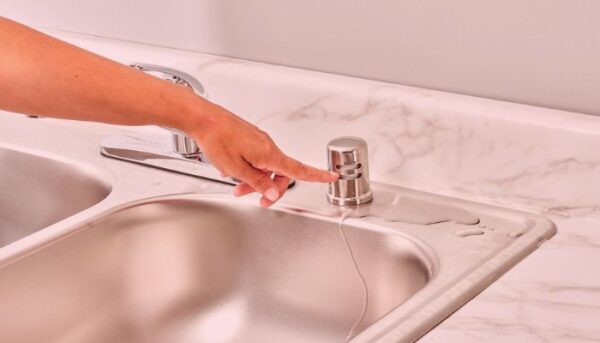
- This is usually found on the sink or countertop.
- Unscrew or pop off the cover and remove any debris that may be blocking it. Clean it thoroughly before reassembling it.
Test the Dishwasher:
- After performing the above steps, run a short cycle to see if the dishwasher drains properly.
- If it does not, you may need to check the drain pump’s functionality using a multimeter to test for continuity. If the pump is faulty, it will need to be replaced.
By following these steps, you can diagnose and fix the most common drainage issues in your Bosch dishwasher, ensuring it runs smoothly and efficiently.
Why Is My Bosch Dishwasher Not Filling With Water?
If your Bosch dishwasher is not filling with water, several potential issues could be at play. Understanding these causes and how to fix them can help get your appliance back to normal operation.
Causes of Water Not Filling
Water Supply Valve Turned Off: The water supply valve, usually located under the sink, might be turned off, preventing water from entering the dishwasher.
Kinked or Blocked Drain Hose: The drain hose can become kinked or blocked, obstructing water flow. Inspect the hose for any visible kinks or bends and ensure it is not blocked.
Low Water Pressure: If the water pressure is too low, the dishwasher may not fill properly. Check the water pressure directly from the tap using a bucket. Approximately 10 liters of water per minute should flow out of the tap when fully open.
Clogged Filter: A blocked filter can prevent water from draining from the previous cycle, which will then prevent the dishwasher from refilling. Ensure the filter is unblocked before proceeding.
Faulty Water Inlet Valve: The water inlet valve controls the flow of water into the dishwasher. If it is clogged with mineral deposits or malfunctioning, it may not allow water to enter the dishwasher.
Steps to Fix the Issue
Check the Water Supply Valve:
- Make sure the water supply valve is switched on. It is easy to forget to switch it on, especially after coming back from a holiday.
- Look for any visible damage to the valve.
Inspect the Drain Hose:
- Locate the drain hose and straighten out any visible kinks or bends.
- If there is a blockage, water will not fill or struggle to fill a bucket when the drain program is selected. Clean the drain hose and siphon if a blockage is found.
Test the Water Pressure:
- Check Directly from the Tap: Use a bucket to measure the water pressure. Approximately 10 liters of water per minute should flow out of the tap when fully open.
- If the water pressure is too low, you may need to consult a plumber to address the issue.
Clean the Filter:
- If the filter is blocked with food remnants or other objects, remove and clean it thoroughly.
- Make sure the filter is clear before proceeding.
Replace the Water Inlet Valve:
- If the above steps do not resolve the issue, the water inlet valve may need to be tested for continuity using a multimeter.
- If the valve is faulty, it will need to be replaced. Watch the below video, if you want to replace the inlet valve by yourself.
By following these steps, you can diagnose and fix the most common water-filling issues in your Bosch dishwasher, ensuring it runs smoothly and efficiently.
Why Is My Bosch Dishwasher Not Cleaning Dishes Properly?
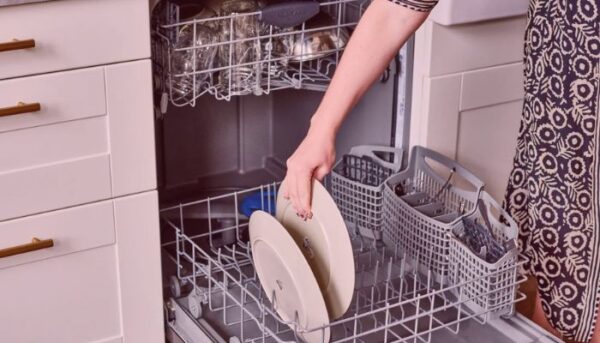
If your Bosch dishwasher is not cleaning dishes properly, it can be frustrating and inconvenient. Understanding the potential causes of this issue and how to fix them can help restore your dishwasher’s performance.
Common Causes of Poor Cleaning Performance
Blocked Filter: The filter at the bottom of the dishwasher traps food particles and debris. If it becomes clogged, it can restrict water flow, resulting in inadequate cleaning.
Obstructed Spray Arms: The spray arms distribute water throughout the dishwasher. If they are blocked by dishes or debris, they may not rotate properly, leading to uneven cleaning.
Improper Loading: Overloading or incorrectly loading dishes can prevent water and detergent from reaching all surfaces, leading to dirty dishes.
Detergent Issues: Using the wrong type of detergent or a malfunctioning detergent dispenser can affect cleaning performance. Detergent needs to be dispensed at the right time and in the right amount to clean effectively.
Water Supply Problems: Insufficient water supply or low water pressure can hinder the dishwasher’s cleaning ability. The water temperature should also be high enough for effective cleaning.
Malfunctioning Water Inlet Valve: If the water inlet valve is defective, it may not allow enough water into the dishwasher, impacting cleaning performance.
Steps to Fix the Issue
Clean the Filter:
- Take out the bottom dish rack to access the filter.
- Twist and lift the filter unit from the bottom of the dishwasher.
- Rinse the filter under warm water and use a soft brush to remove any debris. Ensure it is free from clogs.
- Once cleaned, reinsert the filter unit, ensuring it is secure.
Check the Spray Arms:
- Remove the spray arms by unscrewing or pulling them off, depending on your model. Check for any debris or food particles blocking the spray holes.
- Rinse the spray arms underwater. Use a toothpick to clear any blocked holes.
- Ensure they are securely fastened back in place.
Load the Dishes Properly:
- Make sure not to overload the dishwasher. Leave enough space between items to allow water and detergent to circulate.
- Ensure that tall items do not block the spray arms from rotating. Follow the manufacturer’s guidelines for loading dishes.
Check Detergent Usage
- Ensure you are using a high-quality dishwasher detergent recommended for your Bosch dishwasher, such as Finish.
- Check that the detergent dispenser is clean and opens properly during the wash cycle. Remove any residue that may be clogging it.
Assess Water Supply:
- Ensure that your hot water heater is set to at least 120°F (49°C). Run the hot water in your kitchen sink before starting the dishwasher to ensure hot water is available.
- Verify that the water pressure is sufficient (at least 20 psi). If the water pressure is low, consult a plumber.
Examine the Water Inlet Valve:
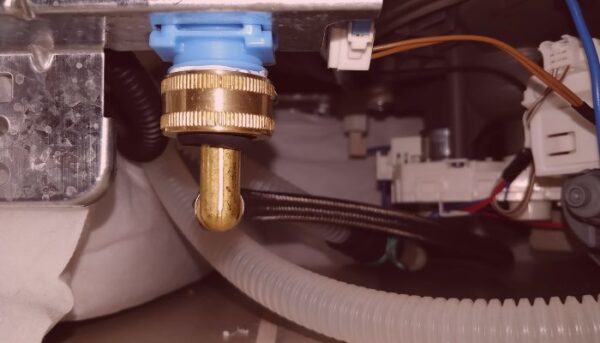
- If the above steps do not resolve the issue, the water inlet valve may be malfunctioning. Inspect it for visible damage or test it with a multimeter for continuity.
- If the valve is defective, it will need to be replaced. Disconnect the water supply and electrical connections, remove the valve, and install a new one.
By following these steps, you can diagnose and fix the most common cleaning issues in your Bosch dishwasher, ensuring it runs smoothly and your dishes come out spotless.
Why There’s Water Leaking From My Bosch Dishwasher?
If your Bosch dishwasher is leaking water, it can lead to significant issues, including water damage to your kitchen floor and cabinetry. Identifying the cause of the leak is crucial for effective repair. Here are the common reasons why your Bosch dishwasher may be leaking and the steps you can take to fix the problem.
Common Causes of Water Leaking
Incorrect or Excessive Detergent: Using too much detergent or the wrong type can cause excessive sudsing, leading to overflow and leaks. Bosch dishwashers require specific detergents, and using others can result in poor performance.
Dishwasher Hose Leak: Over time, hoses can wear out or become damaged, leading to leaks. This includes both the drain hose and the water supply hose.
Faulty Water Inlet Valve: The water inlet valve controls the flow of water into the dishwasher. If it is defective or clogged, it may not shut off properly, causing water to leak.
Worn or Damaged Door Seal: The door seal (gasket) creates a watertight barrier when the door is closed. If it is cracked or worn, water can escape during the wash cycle.
Obstructed Spray Arm: If the spray arm is blocked or not functioning properly, it can cause water to spray incorrectly, leading to leaks.
Faulty Pump and Motor Assembly: A malfunctioning pump or motor assembly can lead to leaks from the bottom of the dishwasher.
Steps to Fix the Leak
Check and Adjust Detergent Use
- Ensure you are using a Bosch-recommended detergent and that you are not overloading the dispenser. Follow the manufacturer’s instructions for the correct amount.
- If you suspect excessive suds, run a rinse cycle without detergent to clear the system.
Inspect Hoses:
- Before inspecting the hoses, turn off the power to the dishwasher and shut off the water supply.
- Take off the kickplate at the bottom of the dishwasher to access the hoses.
- Look for cracks, holes, or loose connections in both the drain hose and the water supply hose. If damage is found, replace the affected hose.
Examine the Water Inlet Valve:
- The water inlet valve is typically located at the back of the dishwasher.
- Check the valve for cracks or mineral buildup. Disconnect the water supply line and inspect the valve for proper operation. If it is faulty, it will need to be replaced.
Inspect the Door Seal:
- Open the dishwasher door and inspect the door seal for any signs of wear, such as cracks or tears.
- If the seal is damaged, order a replacement part and install it according to the manufacturer’s instructions.
Check the Spray Arm:
- Remove the bottom rack and check if the spray arm can rotate freely. If it is blocked by dishes or debris, reposition them.
- If the spray arm is damaged, it may need to be replaced. Remove it and check for cracks or blockages.
Examine the Pump and Motor Assembly:
- If water is leaking from the bottom of the dishwasher, the pump and motor assembly may be the source. Check for cracks in the pump housing or a faulty seal.
- If you find damage, you may need to replace the pump and motor assembly. This typically requires professional assistance unless you are comfortable with appliance repairs.
Why My Bosch Dishwasher Is Not Drying Dishes Properly?

If your Bosch dishwasher is not drying dishes properly, it can be frustrating and may indicate several underlying issues. Understanding the causes of poor drying performance and how to address them can help restore your dishwasher’s efficiency.
Common Causes of Poor Drying Performance
Inadequate Rinse Aid: Rinse aid helps water sheet off dishes, promoting better drying. If the rinse aid dispenser is empty or not functioning, it can lead to wet dishes after a cycle.
Improper Loading: Dishes that are stacked too closely or incorrectly can block airflow and prevent water from evaporating effectively. This can lead to moisture being trapped on the dishes.
Low Water Temperature: If the water temperature is too low, it may not evaporate effectively during the drying cycle. Bosch recommends a water temperature of at least 120°F (49°C) for optimal drying.
Faulty Heating Element: The heating element is responsible for heating the water and drying the dishes. If it is malfunctioning, it may not heat the water adequately, resulting in poor drying performance.
Blocked Vent: The vent allows moisture to escape during the drying cycle. If it is blocked or malfunctioning, it can trap steam inside the dishwasher, preventing proper drying.
Using the Wrong Cycle: Some dishwasher cycles are designed for energy efficiency and may not include a drying phase. Ensure you are using a cycle that includes drying.
Steps to Fix the Poor Drying Issue
Check and Refill Rinse Aid:
- Open the dishwasher door and find the rinse aid dispenser, usually near the detergent compartment.
- If the rinse aid is low or empty, refill it with a quality rinse aid product. This will help improve drying performance.
- If your model allows, adjust the rinse aid setting to a higher level for better drying results.
Inspect Loading Practices
- Ensure that dishes are loaded according to the manufacturer’s guidelines. Avoid overcrowding and ensure that items do not block the spray arms.
- Place larger items at the bottom and smaller items on top, ensuring that they do not overlap and allow air to circulate freely.
Test Water Temperature:
- Run the hot water in your kitchen sink before starting the dishwasher to ensure hot water is available.
- If necessary, adjust your water heater to ensure it is set to at least 120°F (49°C) for optimal cleaning and drying.
Inspect the Heating Element:
- Open the dishwasher and visually inspect the heating element (located at the bottom). Look for any signs of damage or corrosion.
- Use a multimeter to test the heating element for continuity. If it does not have continuity, it will need to be replaced.
Examine the Vent:
- The vent is usually located near the back of the dishwasher door.
- Inspect the vent for any obstructions or debris that may be blocking it. Clean it carefully if necessary.
Use the Correct Cycle:
- Ensure you are using a cycle that includes a drying phase. Some energy-saving cycles may not provide adequate drying.
- If your dishwasher has a “heated dry” option, make sure it is selected for the best drying results.
Why Does My Bosch Dishwasher Randomly Fill With Water?
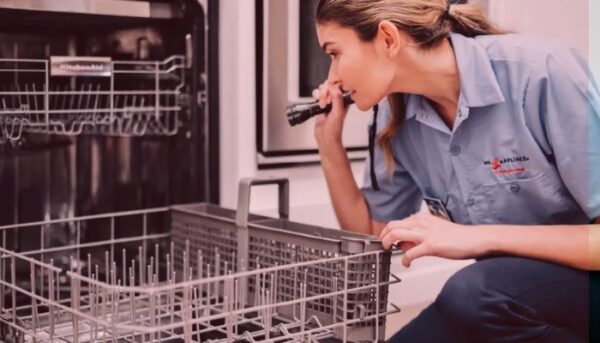
If your Bosch dishwasher is randomly filling with water, it can be a perplexing issue that may lead to water pooling on your kitchen floor. Understanding the potential causes of this problem and how to fix it is essential for maintaining your appliance’s functionality.
Common Causes of Random Water Filling
Faulty Water Inlet Valve: The water inlet valve controls the flow of water into the dishwasher. If it is defective or stuck open, it can cause water to continuously fill the dishwasher, even when it is not in use.
Clogged Drain Hose: A clogged drain hose can create back pressure that may cause water to flow back into the dishwasher. This can happen if there is a blockage in the hose or if it is improperly installed.
Malfunctioning Float Switch: The float switch is a safety mechanism that prevents the dishwasher from overfilling. If it is stuck or malfunctioning, it may not signal the water inlet valve to shut off, resulting in unwanted filling.
Leaky Hose Connections: Loose or damaged connections in the water supply line can lead to leaks that may appear as random filling. Water can accumulate in the dishwasher due to these leaks.
Incorrect Installation: If the dishwasher is not installed correctly, it may not drain properly, leading to water accumulation that could trigger the filling mechanism.
Steps to Fix the Random Water Filling Issue
Inspect the Water Inlet Valve:
- The water inlet valve is typically found at the back of the dishwasher.
- Inspect the valve for any visible signs of damage or mineral buildup. If it appears faulty, it may need to be replaced.
- Use a multimeter to check for continuity. If there is no continuity, the valve is defective and should be replaced.
Examine the Drain Hose:
- Inspect the drain hose for kinks or clogs. A blockage can cause water to back up into the dishwasher.
- If you find a blockage, disconnect the hose and clean it thoroughly. You can run water through it to ensure it is clear.
- Make sure the drain hose is installed correctly, with no sharp bends that could impede water flow.
Test the Float Switch:
- The float switch is usually located at the bottom of the dishwasher.
- Ensure that the float moves freely up and down. If it is stuck, gently clean around it to remove any debris.
- Use a multimeter to check the float switch for continuity. If it is malfunctioning,the whole float switch assembly will need to be replaced.
Inspect Hose Connections:
- Examine all hose connections for signs of leaks or loose fittings. Tighten any loose connections and replace any damaged hoses.
- If you notice water pooling near the dishwasher, trace the source back to the hose connections.
Verify Installation:
- Ensure that the dishwasher is level. An improperly leveled dishwasher can lead to drainage issues, causing water to accumulate.
- If you suspect incorrect installation, consult the installation manual to ensure all connections are properly configured.
Why Is Dirty Water Filled in My Bosch Dishwasher?
If your Bosch dishwasher is filled with dirty water, it indicates a drainage issue that needs to be addressed promptly. This problem can lead to unpleasant odors and unsanitary conditions, as well as potentially damaging your appliance. Below are the common causes of this issue and detailed steps on how to fix it.
Common Causes of Dirty Water Accumulation
Clogged Filter: The filter in your dishwasher is designed to trap food particles and debris. If it becomes clogged, it can prevent water from draining properly, leading to a buildup of dirty water.
Blocked Drain Pump: The drain pump is responsible for expelling water from the dishwasher. If it is blocked with debris, it may fail to drain water effectively.
Kinked or Blocked Drain Hose: The drain hose carries water from the dishwasher to the sink or garbage disposal. If this hose is kinked, twisted, or blocked, it can cause water to back up into the dishwasher.
Faulty Water Inlet Valve: If the water inlet valve is malfunctioning, it may allow water to enter the dishwasher even when it is not in use, leading to an accumulation of dirty water.
Improper Installation: If the dishwasher is not installed correctly, it may not drain properly, causing dirty water to remain in the bottom.
Steps to Fix the Dirty Water Issue
- Clean the dishwasher filter with soapy warm water.
- Check the drain pump for debris and clean it.
- Inspect the drain hose for kinks or twists and straighten it.
- Check the water inlet valve for any signs of damage.
- Ensure that the appliance is leveled correctly.
What Signs Indicate That I Need to Call a Professional?
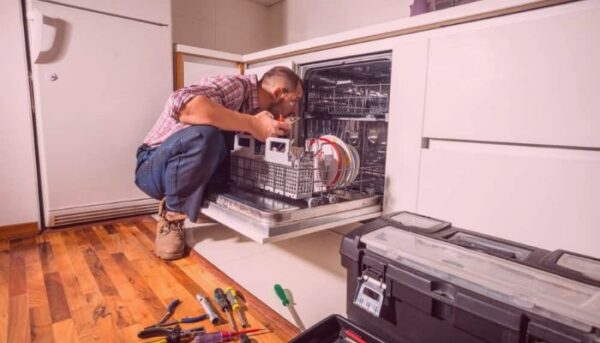
When dealing with issues related to your Bosch dishwasher, there are several signs that indicate it may be time to call a professional for help. Recognizing these signs early can prevent further damage to your appliance and ensure it operates efficiently.
- Persistent Error Codes or Warning Lights: If your dishwasher displays error codes or warning lights that persist after attempting basic troubleshooting, it may indicate a more serious issue. For example, a flashing “water tap” symbol often signals a water supply problem, which may require professional intervention to diagnose and fix.
- Unusual Noises: If your dishwasher is making loud or unusual noises during operation, such as grinding, banging, or excessive humming, this may indicate a problem with the motor, pump, or other internal components. These issues often require a technician to assess and repair.
- Water Leaks: If you notice water pooling around the base of the dishwasher or any leaks during operation, this could suggest a faulty door seal, damaged hoses, or issues with the pump. Addressing leaks promptly is crucial to prevent water damage to your kitchen.
- Inconsistent Performance: If your dishwasher is not cleaning dishes properly, not drying them, or if you experience random filling with water, these issues could stem from multiple causes that may be complex to diagnose without professional expertise.
- Repeated Clogs or Drainage Issues: If you find yourself frequently cleaning the filter or drain pump due to clogs, or if the dishwasher fails to drain even after cleaning, it may indicate a deeper plumbing issue that requires professional evaluation.
- Control Panel Malfunctions: If the control panel is unresponsive, buttons are stuck, or the display is malfunctioning, this could indicate an electrical issue or a problem with the control board. Repairing these components often requires specialized knowledge and tools.
- Age of the Appliance: If your Bosch dishwasher is older and you are experiencing multiple issues, it might be more cost-effective to consult a professional for a comprehensive evaluation rather than attempting multiple repairs. Older appliances may have outdated components that are harder to replace or repair.
- Beeping Patterns: If your dishwasher is beeping without any clear indication of why, or if the beeping patterns suggest a malfunction (such as beeping three times indicating a leak), it is advisable to seek professional help to diagnose the issue accurately.
How do I Maintain My Bosch Dishwasher for Optimal Performance?
To maintain your Bosch dishwasher for optimal performance, regular care and attention are essential. Here are detailed tips and strategies to ensure your dishwasher operates efficiently and effectively:
Maintenance Tips for Your Bosch Dishwasher
- Scrape-Off Food Scraps: Before loading dishes, scrape off large food particles to prevent clogging the filter and drainage system.
- Load Dishes Correctly: Place plates, bowls, and cups facing downwards to ensure thorough cleaning. Ensure dishes do not overlap to avoid blind spots where water jets cannot reach. Make sure the spray arms can rotate freely without obstruction.
- Clean the Filter Regularly: Wash the filter thoroughly with warm, soapy water once a month. Check for signs of wear or damage that may require replacement.
- Use the Right Detergent: Use Bosch-recommended detergent in the appropriate dosage to avoid residue and ensure effective cleaning. Adhere to the guidelines provided in the user manual to prevent excessive suds and poor performance.
- Utilize Rinse Aid: Regularly check and refill the rinse aid dispenser to help water sheet off dishes and enhance drying.
- Check Water Temperature: Ensure your hot water heater is set to at least 120°F (49°C) for optimal cleaning and sanitization.
- Run Regular Cleaning Cycles: Run a cleaning cycle with a dishwasher-specific cleaner once a month to remove grease, limescale, and odors. Use the machine care program if your model has it to maintain internal components.
- Inspect and Clean the Spray Arms: Remove and inspect the spray arms for food debris or mineral buildup, cleaning them thoroughly. Reattach the spray arms securely to allow free rotation during the wash cycle.
- Neutralize Hard Water Effects: Regularly refill the dishwasher salt compartment to soften hard water, preventing mineral buildup and ensuring cleaner dishes.
- Keep the Door Seal Clean: Clean the door seal with a damp cloth to remove food particles or debris that may affect sealing.
By following these tips, you can ensure your Bosch dishwasher remains in top condition, providing reliable and efficient performance.
Frequently Asked Questions
What Is the Life Expectancy of a Bosch Dishwasher?
The life expectancy of a Bosch dishwasher is typically around 10 years. With proper care and regular maintenance, some models can last even longer, up to 12 years. Usage patterns and adherence to recommended maintenance routines significantly impact the appliance’s longevity.
Is It Worth Fixing a Bosch Dishwasher?
Whether to fix a Bosch dishwasher depends on its age, repair cost, and condition. If it’s over 7-8 years old or repairs exceed half the cost of a new one, replacement might be better. Well-maintained units under warranty are more likely worth repairing.
What Is the Least Problem Dishwasher?
Bosch, Miele, and Whirlpool dishwashers are renowned for reliability. Bosch stands out for its quiet operation and energy efficiency, Miele for durability and high-end features, and Whirlpool for affordability and consistent performance. Regular maintenance enhances their longevity and reduces issues.
Why Does My Bosch Dishwasher Leave Soap on Dishes?
Soap residue on dishes can result from improper detergent use, a clogged filter, a kinked or blocked drain hose, low water temperature, insufficient rinse aid, or faulty spray arms. Addressing these issues by using the right detergent, cleaning filters, and ensuring proper water flow can help.
Conclusion
Bosch dishwashers are renowned for their reliability, but users may encounter common issues like drainage problems. Clogged filters or a faulty drain pump often cause water to stand and create unpleasant odors. Addressing these issues involves cleaning the filter, checking the drain pump, and inspecting the drain hose for obstructions.
Water filling and cleaning issues can arise from a malfunctioning water inlet valve, low water pressure, or improper loading of dishes. Ensuring the water supply valve is on, inspecting hoses for kinks, and using the correct detergent can resolve these problems.
Leaks may be due to excess detergent, damaged hoses, or a faulty door seal. Adjusting detergent usage and inspecting hoses and seals can help mitigate leaks.
For optimal performance, regular maintenance like cleaning filters, checking water temperature, and using rinse aid is crucial. Proper care ensures your Bosch dishwasher continues to operate efficiently.
